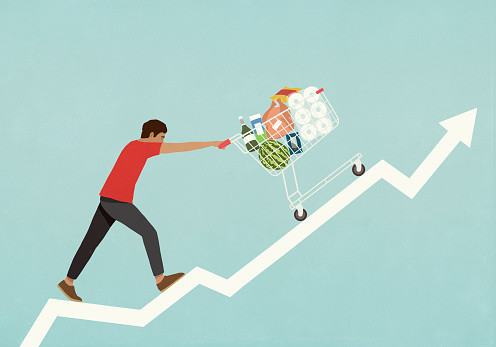
Having gone through a series of financial crises in recent decades, Argentines are no strangers to economic upheaval.
However, with inflation surging past 100% and the peso's value falling, even some of the most crisis-hardened Argentines are finding it difficult to make ends meet in the face of rapidly fluctuating prices and a skyrocketing cost of living.
Five Argentines were interviewed by reporter Valley Fontaine about how they make ends meet.
1. Buy now, pay later
For the first time in more than 30 years, Argentinean inflation in February went beyond the 100% mark, BBC reported.
That indicates that many consumer goods' costs have doubled in only the past year.
Therefore, saving up for a particular buy or even everyday items can result in you having to pay more in a few months or even weeks from now.
The response? Using credit with no interest.
Buenos Aires-based digital artist Monica has perfected the buy-now-pay-later strategy.
The 27-year-old makes use of the numerous supermarket and clothing store interest-free credit alternatives.
"I buy everything on interest-free instalments. Payments are usually spread over 3 months or more," she explains.
So even if Monica does not have the money to buy a pair of shoes costing 20,000 pesos outright, she will try to buy them in four 5,000-peso instalments, rather than risk returning to the shop once she has saved up 20,000 pesos and risk the shoes' price having risen to 25,000 pesos.
"If I can't pay in instalments, I usually won't buy it," she says.
2. Barter or swap
Some Argentines are struggling to make ends meet at the end of the month and cannot even afford the necessities due to the country's sharp price increases.
The majority of Teresa's income, a cleaner from Mar del Plata, goes toward paying her rent.
Another significant portion is spent on travel to the residences she cleans. She rides public transportation for at least four hours every day.
The 31-year-old has few alternatives for stretching her money because she has so little extra money and so little free time.
"When I run out of money, I will hitchhike or walk," she says.
Teresa says that finding people who are in a similar situation has helped her get by without cash.
"I joined a club where people swap items. Last week, I swapped a pair of shoes that one of my clients gave me in exchange for milk, toothpaste, bread and other food items."
3. Bulk buying
However, the increasing inflation is proving to be a problem even for individuals who may have some money left over at the end of the month.
When inflation is this severe, saving money in pesos means that your money will quickly lose value.
You will get 100,000 pesos plus interest per year if you deposit 100,000 pesos in your savings account in February 2022.
Your pesos will, however, be worth less than they did a year ago because the interest rate is lower than the inflation rate.
What then do Argentineans do with any extra cash they may have at the end of the month?
Noira, a nurse from Mendoza, said she makes an effort to purchase huge quantities of things that would not expire.
"I buy popular non-perishable things like coffee and toilet paper in bulk to prevent the devaluation of my salary," the 59-year-old explains.
She attempts to convert any leftovers from her bulk purchases into dollars because the peso is so volatile.
A far safer investment is thought to be U.S. cash. In actuality, the value of the dollar relative to the peso has been rising quickly.
It increased by 7% in a single day in April, lasting only 24 hours.
4. Buying dollars
Although the peso is the country's official currency, many Argentines, including Noira, have little faith in it and would rather exchange any extra pesos for dollars.
Jorge, a 23-year-old business student, prefers to retain his dollars at home because he doesn't just believe that the dollar would remain stable despite the peso's instability, but also because he has little faith in Argentina's banks.
His family's experience during Argentina's 2001 crisis, when the government at the time imposed restrictions on the amount of money Argentines could remove from their bank accounts, is the source of his mistrust in the banking system.
Banks failed, resulting in the permanent loss of people's life savings. The father of Jorge lost savings of $60,000 (£47,500).
"When the banks went bankrupt and wouldn't give us our money back, we had to sell our home," he recalls.
More than 20 years later, he, like many other Argentines, remains wary of entrusting banks with his savings.
"I am too scared to put my money in the bank, so I buy US dollars with any unspent income that I earn. "
Buying dollars in Argentina is not a simple transaction.
"Buying dollars is not cheap, because I have to buy most of them at the higher 'blue' dollar rate," he says,
On 30 Apr., Jorge paid 469 pesos for just one dollar on the informal market.
He thinks the dollar will hold its value, unlike the peso.
5. Spend, Spend, Spend
However, while believing it to be a safer option, many Argentines' salary does not allow them to buy U.S. cash due to the high blue dollar to peso exchange rate.
"I can't afford to buy dollars and my pesos devalue in my hands," says 25-year-old shop assistant Roberta.
She spends as much as she can "as quickly as possible" to avoid watching her extra money depreciate.
This is a common practice, with prices increasing by 6–10% per month. However, when inflation rises, she receives fewer pesos each month.
"Each month, I can't afford to buy what I bought the month before."
© 2025 Latin Times. All rights reserved. Do not reproduce without permission.




